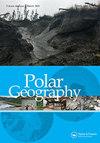第二部分:教育和知识共享在支持北极可持续发展中的作用的新视角
IF 1.6
Q3 GEOGRAPHY, PHYSICAL
引用次数: 0
摘要
在《极地地理:教育与可持续发展》特刊的下半期,我们将精选另外四篇文章,从不同的角度探讨教育在支持可持续发展方面所起的作用,以及如何最好地参与解决这一问题和相关主题的研究。通过他所认定的非殖民化的自动人种学,达塔探索了因纽特人的陆地教育作为改变环境科学教育的一种手段。在书中,他提出了一个令人信服的论点,认为陆基教育是可持续发展教育和教育本身可持续发展的关键组成部分。Sergunin和Gutenev向读者介绍了培养俄罗斯北极专家的俄罗斯大学的可持续发展教育状况。他们探讨了在各个机构中如何教授这一内容领域的成功和问题。虽然他们发现可持续发展教育总体上有所收获,但他们发现不同机构对可持续发展概念的解释不一致,而且很少有例子可以将可持续发展的环境、经济和社会组成部分综合起来。他们的分析和批评可以应用于西方机构,并有助于加强整个北极地区的可持续发展教育。Speca描述了北极教育工作者和学习者在试图以与他们的北极环境相关的方式理解可持续发展理念时所面临的挑战。他主张使用外交模拟,特别是模拟北极理事会演习,让学生参与体验式学习,既能应对可持续发展教育的挑战,又能获得其他有价值的学习成果。最后,Lauter提供了一篇关于研究人员如何更好地与土著社区成员合作生产知识的思想文章。她描述了在获得访问和信任方面的挑战,特别是在认识和解决研究人员和社区伙伴之间的权力不平衡方面的挑战,然后提供了作为一个进入社区的局外人建立关系的方法。特别是,她示范了如何让土著合作者不仅参与研究本身,而且批判性地反思参与研究的过程,从进入社区到完成最终产品。这项工作为那些希望探索北极可持续发展的北极以外的人提供了重要的见解。正如我在本期特刊的第一部分所指出的那样,在关于可持续发展的讨论中,教育通常被忽视,在这些讨论中,教育和知识转移的定义和讨论方式往往非常狭隘。这一卷,与第一卷一起,表明有许多方式来理解教育在支持北极可持续发展方面所起的作用。但是,仅仅观察这些过程是不够的。在我们探讨这个话题时,批判性地审视我们自己的镜头和假设也很重要。这一系列文章带来了多种理论和实践方法来研究和反思过程和我们在这些努力中的立场。我希望它能帮助研究人员扩展他们对可持续发展的思考,知识共享的作用,以及我们如何继续共同努力,建立更好的系统,发展和分享关键的学习,推动北极社区走向强大和健康的未来。本文章由计算机程序翻译,如有差异,请以英文原文为准。
Editor’s Introduction Part II: new lenses on the role of education and knowledge sharing in support of sustainable development in the Arctic
In this second half of the special issue of Polar Geography on Education and Sustainable Development, we feature four more articles that provide different lenses about the role education plays in supporting sustainable development efforts and around how best to engage in research addressing this and related topics. Through what he identifies as a decolonial auto-ethnography, Datta explores Inuit land-based education as a means for transforming environmental science education. In it, he offers a compelling argument for land-based education as a key component in education about sustainability and education that is in itself sustainable. Sergunin and Gutenev guide readers through the state of education on sustainable development in the Russian universities that train Russian Arctic specialists. They explore both the successes and problems in how this content area is taught across institutions. While they found gains in sustainability education in general, they found inconsistencies in how different institutions interpreted the concept of sustainable development and few examples of an integrated concept across environmental, economic, and social components of sustainability. Their analyses and critiques could be applied to Western institutions and could help strengthen how sustainable development is taught across the Arctic. Speca describes the challenges facing Arctic educators and learners as they try to make sense of the idea of sustainable development in ways that are relevant in their Arctic contexts. He argues for using diplomatic simulations, especially Model Arctic Council exercises, to engage students in experiential learning that both meets these challenges of educating on sustainable development while achieving other valuable learning outcomes. Finally, Lauter offers a thought piece on how researchers can better engage with Indigenous community members in the co-production of knowledge. She describes the challenges in gaining access and trust and especially in recognizing and addressing the imbalance of power between researchers and community partners and then offers ways to build relationships as an outsider entering a community. In particular, shemodels how to involve Indigenous collaborators not only in the research itself but in reflecting critically on the process of engaging in research, fromentering the community to completing thefinal product. Thiswork offers important insights to those from outside the Arctic looking to explore sustainable development in the North. As I noted in the first part of this special issue, education often is overlooked in discussions about sustainable development generally, and the ways education and knowledge transfer are defined and discussed in these discussions tend to be very narrow. This volume, along with the first, shows there are many ways to understand the role education plays in supporting sustainable development in the Arctic. But, it is not enough to simply look at these processes. It is also important to critically examine our own lenses and assumptions as we explore this topic. This collection of articles brings to bear multiple theoretical and practical approaches to research and reflection on processes and our stances in these efforts. I hope it helps researchers expand their thinking about sustainable development, the role of knowledge sharing, and how we might continue to work collectively toward better systems for developing and sharing critical learnings to move Arctic communities toward strong and healthy futures.
求助全文
通过发布文献求助,成功后即可免费获取论文全文。
去求助
来源期刊

Polar Geography
GEOGRAPHY, PHYSICAL-
CiteScore
5.30
自引率
0.00%
发文量
13
期刊介绍:
Polar Geographyis a quarterly publication that offers a venue for scholarly research on the physical and human aspects of the Polar Regions. The journal seeks to address the component interplay of the natural systems, the complex historical, political, economic, cultural, diplomatic, and security issues, and the interchange amongst them. As such, the journal welcomes comparative approaches, critical scholarship, and alternative and disparate perspectives from around the globe. The journal offers scientists a venue for publishing longer papers such as might result from distillation of a thesis, or review papers that place in global context results from coordinated national and international efforts currently underway in both Polar Regions.
 求助内容:
求助内容: 应助结果提醒方式:
应助结果提醒方式:


